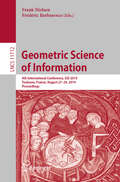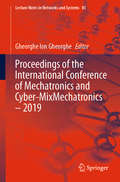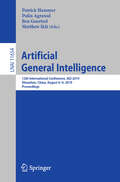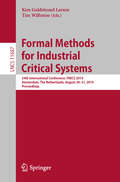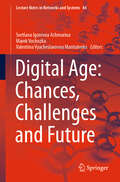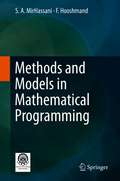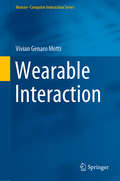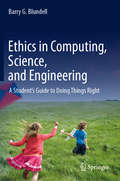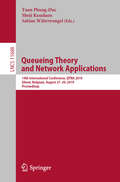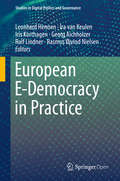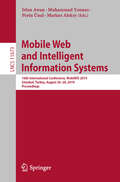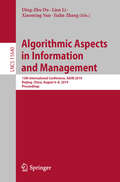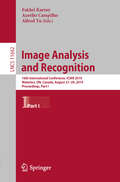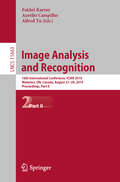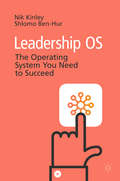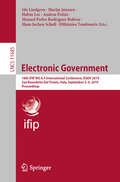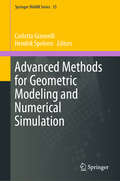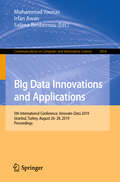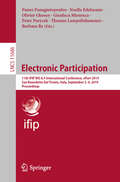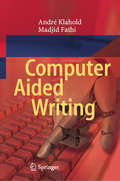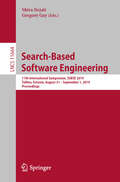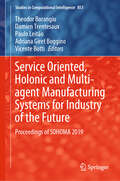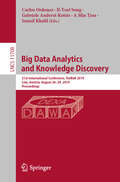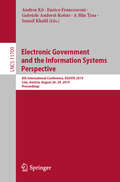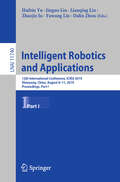- Table View
- List View
Geometric Science of Information: 4th International Conference, GSI 2019, Toulouse, France, August 27–29, 2019, Proceedings (Lecture Notes in Computer Science #11712)
by Frank Nielsen Frédéric BarbarescoThis book constitutes the proceedings of the 4th International Conference on Geometric Science of Information, GSI 2019, held in Toulouse, France, in August 2019.The 79 full papers presented in this volume were carefully reviewed and selected from 105 submissions. They cover all the main topics and highlights in the domain of geometric science of information, including information geometry manifolds of structured data/information and their advanced applications.
Proceedings of the International Conference of Mechatronics and Cyber-MixMechatronics – 2019 (Lecture Notes in Networks and Systems #85)
by Gheorghe Ion GheorgheThese proceedings gather contributions presented at the 3rd International Conference of Mechatronics and Cyber-MixMechatronics/ICOMECYME, organized by the National Institute of R&D in Mechatronics and Measurement Technique in Bucharest, Romania, on September 5th–6th, 2019. Reflecting the expansion mechatronics, it discusses topics in the newer trans-disciplinary fields, such as adaptronics, integronics, and cyber-mixmechatronics. With a rich scientific tradition and attracting specialists from around the globe – including North America, South America, and Asia – ICOMECYME focuses on presenting the latest research. It is mainly directed at academics and advanced students, but also appeals to R&D experts, offering a platform for scientific exchange. These proceedings are a valuable resource for entrepreneurs who want to invest in research and who are open for collaborations.
Artificial General Intelligence: 12th International Conference, AGI 2019, Shenzhen, China, August 6–9, 2019, Proceedings (Lecture Notes in Computer Science #11654)
by Patrick Hammer Pulin Agrawal Ben Goertzel Matthew IkléThis book constitutes the refereed proceedings of the 12th International Conference on Artificial General Intelligence, AGI 2019, held in Shenzhen, China, in August 2019. The 16 full papers and 5 poster papers presented in this book were carefully reviewed and selected from 30 submissions. The papers are covering AGI architectures, discussing mathematical foundations, philosophical foundations, safety and ethics, and developing ideas from neuroscience and cognitive science.
Formal Methods for Industrial Critical Systems: 24th International Conference, FMICS 2019, Amsterdam, The Netherlands, August 30–31, 2019, Proceedings (Lecture Notes in Computer Science #11687)
by Kim Guldstrand Larsen Tim WillemseThis book constitutes the proceedings of the 24th International Conference on Formal Methods for Industrial Critical Systems, FMICS 2019, held in Amsterdam, The Netherlands, in August 2019. The 9 regular papers presented in this volume were carefully reviewed and selected from 15 submissions. The conference also featured invited talks by Jaco van de Pol (Aarhus University, and Twente University), jointly with CONCUR, and Holger Hermanns (Universität des Saarlandes) and a special session on (commercial) formal methods in industry. The aim of the FMICS conference series is to provide a forum for researchers who are interested in the development and application of formal methods in industry. In particular, FMICS brings together scientists and engineers who are active in the area of formal methods and interested in exchanging their experiences in the industrial usage of these methods. The FMICS conference series also strives to promote research and development for the improvement of formal methods and tools for industrial applications.
Digital Age: Chances, Challenges and Future (Lecture Notes in Networks and Systems #84)
by Svetlana Igorevna Ashmarina Marek Vochozka Valentina Vyacheslavovna MantulenkoThis proceedings book presents the outcomes of the VII International Scientific Conference “Digital Transformation of the Economy: Challenges, Trends, New Opportunities”, which took place in Samara, Russian Federation, on April 26–27, 2019. Organized by the Samara State University of Economics, the conference chiefly focused on digital economy issues, such as theoretical preconditions for the development of economic systems in the digital age and specific practical issues related to real-world business practice. Consisting of six chapters corresponding to the thematic areas of the conference, and written by scientists and practitioners from different regions of Russia, Kazakhstan, the Czech Republic and Germany, the book offers answers to the most pressing questions for today’s business community: - How is our world changing under the influence of digital technology? - Is sustainable economic development a myth or reality in the context of digitalization? - What threats and opportunities does digitalization bring? - What are realities and prospects of digitalization in the context of business practice? - How do we create a digital infrastructure for the economy? - How should the legal environment of the economy be transformed in the context of digitalization? The conclusions and recommendations presented are not recipes for solving the existing economic problems, but instead are intended for use in further research on transformation processes in the economy and in the development of state economic policies in various countries and regions.
Methods and Models in Mathematical Programming
by F. Hooshmand S. A. MirHassaniThis book focuses on mathematical modeling, describes the process of constructing and evaluating models, discusses the challenges and delicacies of the modeling process, and explicitly outlines the required rules and regulations so that the reader will be able to generalize and reuse concepts in other problems by relying on mathematical logic.Undergraduate and postgraduate students of different academic disciplines would find this book a suitable option preparing them for jobs and research fields requiring modeling techniques. Furthermore, this book can be used as a reference book for experts and practitioners requiring advanced skills of model building in their jobs.
Wearable Interaction (Human–Computer Interaction Series)
by Vivian Genaro MottiThis book offers the reader a comprehensive view of the design space of wearable computers, cutting across multiple application domains and interaction modalities. Besides providing several examples of wearable technologies, Wearable Interaction illustrates how to create and to assess interactive wearables considering human factors in design decisions related to input entry and output responses. The book also discusses the impacts of form factors and contexts of use in the design of wearable interaction. Miniaturized components, flexible materials, and sewable electronics toolkits exemplify advances in technology that facilitated the design and development of wearable technologies. Despite such advances, creating wearable interfaces that are efficient is still challenging. The new affordances of on-body interfaces require the consideration of new interaction paradigms, so that the design decisions for the user interaction take into account key limitations in the interaction surfaces of wearables concerning input entry, processing power for output responses, and in the time and attention that wearers dedicate to complete their interaction. Under such constraints, creating interfaces with high usability levels is complex. Also, because wearables are worn continuously and in close contact with the human body, on-body interfaces must be carefully designed to neither disturb nor overwhelm wearers. The context of use and the potential of wearable technologies must be both well understood to provide users with relevant information and services using appropriate approaches and without overloading them with notifications. Wearable Interaction explains thoroughly how interactive wearables have been created taking into account the needs of end users as well as the vast potential that wearable technologies offer. Readers from academia, industry or government will learn how wearables can be designed and developed to facilitate human activities and tasks across different sectors.
Ethics in Computing, Science, and Engineering: A Student’s Guide to Doing Things Right
by Barry G. BlundellThis comprehensive textbook introduces students to the wide-ranging responsibilities of computing, science and engineering professionals by laying strong transdisciplinary foundations and by highlighting ethical issues that may arise during their careers. The work is well illustrated, and makes extensive use of both activities, and ethical dilemmas which are designed to stimulate reader engagement. A number of memorable case studies are also included and frequently draw on the demanding aerospace industry. The book adopts a strongly human centric approach, with matters such as privacy erosion and censorship being viewed not only in their current context but also in terms of their ongoing evolution. What are our individual ethical responsibilities for ensuring that we do not develop for future generations a technological leviathan with the potential to create a dystopian world? A broad range of technologies and techniques are introduced and are examined within an ethical framework. These include biometrics, surveillance systems (including facial recognition), radio frequency identification devices, drone technologies, the Internet of Things, and robotic systems. The application and potential societal ramifications of such systems are examined in some detail and this is intended to support the reader in gaining a clear insight into our current direction of travel. Importantly, the author asks whether we can afford to allow ongoing developments to be primarily driven by market forces, or whether a more cautious approach is needed. Further chapters examine the benefits that are associated with ethical leadership, environmental issues relating to the technology product lifecycle (from inception to e-waste), ethical considerations in research (including medical experimentation involving both humans and animals), and the need to develop educational programs which will better prepare students for the needs of a much more fluid employment landscape. The final chapter introduces a structured approach to ethical issue resolution, providing a valuable, long-term source of reference. In addition it emphasises the ethical responsibilities of the professional, and considers issues that can arise when we endeavour to effect ethically sound change within organisations. Examples are provided which highlight the possible ramifications of exercising ethical valour. The author has thus created an extensively referenced textbook that catalyses student interest, is internationally relevant, and which is multicultural in both its scope and outlook.
Queueing Theory and Network Applications: 14th International Conference, QTNA 2019, Ghent, Belgium, August 27–29, 2019, Proceedings (Lecture Notes in Computer Science #11688)
by Tuan Phung-Duc Shoji Kasahara Sabine WittevrongelThis book constitutes the proceedings of the 14th International Conference on Queueing Theory and Network Applications, QTNA 2019, held in Ghent, Belgium, in August 2019.The 23 full papers included in this volume were carefully reviewed and selected from 49 initial submissions. The papers are organized in topical sections on Retrial Queues; Controllable Queues; Strategic Queues; Queueing Networks; Scheduling Policies; Multidimensional Systems; and Queueing Models in Applications.
European E-Democracy in Practice (Studies in Digital Politics and Governance)
by Leonhard Hennen Ira Van Keulen Iris Korthagen Georg Aichholzer Ralf Lindner Rasmus Øjvind NielsenThis open access book explores how digital tools and social media technologies can contribute to better participation and involvement of EU citizens in European politics. By analyzing selected representative e-participation projects at the local, national and European governmental levels, it identifies the preconditions, best practices and shortcomings of e-participation practices in connection with EU decision-making procedures and institutions. The book features case studies on parliamentary monitoring, e-voting practices, and e-publics, and offers recommendations for improving the integration of e-democracy in European politics and governance. Accordingly, it will appeal to scholars as well as practitioners interested in identifying suitable e-participation tools for European institutions and thus helps to reduce the EU’s current democratic deficit. This book is a continuation of the book “Electronic Democracy in Europe” published by Springer.
Mobile Web and Intelligent Information Systems: 16th International Conference, MobiWIS 2019, Istanbul, Turkey, August 26–28, 2019, Proceedings (Lecture Notes in Computer Science #11673)
by Irfan Awan Muhammad Younas Perin Ünal Markus AleksyThis book constitutes the refereed proceedings of the 16th International Conference on Mobile Web and Intelligent Information Systems, MobiWIS 2019, held in Istanbul, Turkey, in August 2019. The 23 full papers presented together with 3 short papers were carefully reviewed and selected from 74 submissions. The papers of the MobiWIS 2019 deal with areas such as: mobile apps and services; web and mobile applications; security and privacy; wireless networks and cloud computing; intelligent mobile applications; and mobile web and practical applications.
Algorithmic Aspects in Information and Management: 13th International Conference, AAIM 2019, Beijing, China, August 6–8, 2019, Proceedings (Lecture Notes in Computer Science #11640)
by Ding-Zhu Du Lian Li Xiaoming Sun Jialin ZhangThis volume constitutes the proceedings of the 13th International Conference on Algorithmic Aspects in Information and Management, AAIM 2019, held in Bejing, China in August 2019. The 31 full papers presented were carefully reviewed and selected. The papers deal with most aspects of theoretical computer science and their applications. Special considerations are given to algorithmic research that is motivated by real-world applications.
Image Analysis and Recognition: 16th International Conference, ICIAR 2019, Waterloo, ON, Canada, August 27–29, 2019, Proceedings, Part I (Lecture Notes in Computer Science #11662)
by Fakhri Karray Aurélio Campilho Alfred YuThis two-volume set LNCS 11662 and 11663 constitutes the refereed proceedings of the 16th International Conference on Image Analysis and Recognition, ICIAR 2019, held in Waterloo, ON, Canada, in August 2019. The 58 full papers presented together with 24 short and 2 poster papers were carefully reviewed and selected from 142 submissions. The papers are organized in the following topical sections: Image Processing; Image Analysis; Signal Processing Techniques for Ultrasound Tissue Characterization and Imaging in Complex Biological Media; Advances in Deep Learning; Deep Learning on the Edge; Recognition; Applications; Medical Imaging and Analysis Using Deep Learning and Machine Intelligence; Image Analysis and Recognition for Automotive Industry; Adaptive Methods for Ultrasound Beamforming and Motion Estimation.
Image Analysis and Recognition: 16th International Conference, ICIAR 2019, Waterloo, ON, Canada, August 27–29, 2019, Proceedings, Part II (Lecture Notes in Computer Science #11663)
by Fakhri Karray Aurélio Campilho Alfred YuThis two-volume set LNCS 11662 and 11663 constitutes the refereed proceedings of the 16th International Conference on Image Analysis and Recognition, ICIAR 2019, held in Waterloo, ON, Canada, in August 2019. The 58 full papers presented together with 24 short and 2 poster papers were carefully reviewed and selected from 142 submissions. The papers are organized in the following topical sections: Image Processing; Image Analysis; Signal Processing Techniques for Ultrasound Tissue Characterization and Imaging in Complex Biological Media; Advances in Deep Learning; Deep Learning on the Edge; Recognition; Applications; Medical Imaging and Analysis Using Deep Learning and Machine Intelligence; Image Analysis and Recognition for Automotive Industry; Adaptive Methods for Ultrasound Beamforming and Motion Estimation.
Leadership OS: The Operating System You Need to Succeed
by Nik Kinley Shlomo Ben-HurBased on years of original research, this book controversially counters almost every existing leadership model and approach.It shows how as leaders rise to senior levels, their roles become less about doing things that directly drive results and more about directing and supporting others to achieve objectives. Using case studies and research insights the authors reveal how leadership success is thus not so much about having the right core capabilities, but about creating the right environment.Using the analogy of a smartphone operating system (OS), the book presents a new way of thinking about leadership. The authors provide a clear and practical framework to follow and show how your leadership OS becomes the impact you have, the imprint you make and the foundation of your legacy as a leader.After reading it, you will learn:· How to diagnose the impact you have as a leader and understand the OS you create· How famous business and societal leaders have created effective – and sometimes ineffective – OSs· How to optimise your OS to produce the best results· How to get people working together effectively, and be a high-performing leaderProviding you with practical and easy to follow advice, this book will show you how leadership success is not about having the core capabilities, but about creating the right operating systems for your organisation.
Electronic Government: 18th IFIP WG 8.5 International Conference, EGOV 2019, San Benedetto Del Tronto, Italy, September 2–4, 2019, Proceedings (Lecture Notes in Computer Science #11685)
by Ida Lindgren Marijn Janssen Habin Lee Andrea Polini Manuel Pedro Rodríguez Bolívar Hans Jochen Scholl Efthimios TambourisThis book constitutes the proceedings of the 18th IFIP WG 8.5 International Conference on Electronic Government, EGOV 2019, held in San Benedetto del Tronto, Italy, in September 2019, in conjunction with the IFIP WG 8.5 IFIP International Conference on Electronic Participation (ePart 2019) and the International Conference for E-Democracy and Open Government Conference (CeDEM 2019).The 27 revised full papers presented were carefully reviewed and selected from 64 submissions. The papers are clustered under the following topical sections: E-Government Foundations; E-Government Services and Open Government; Open Data: Social and Technical Aspects; AI, Data Analytics and Automated Decision Making; and Smart Cities.
Advanced Methods for Geometric Modeling and Numerical Simulation (Springer INdAM Series #35)
by Carlotta Giannelli Hendrik SpeleersThis book gathers selected contributions presented at the INdAM Workshop “DREAMS”, held in Rome, Italy on January 22−26, 2018. Addressing cutting-edge research topics and advances in computer aided geometric design and isogeometric analysis, it covers distinguishing curve/surface constructions and spline models, with a special focus on emerging adaptive spline constructions, fundamental spline theory and related algorithms, as well as various aspects of isogeometric methods, e.g. efficient quadrature rules and spectral analysis for isogeometric B-spline discretizations. Applications in finite element and boundary element methods are also discussed. Given its scope, the book will be of interest to both researchers and graduate students working in these areas.
Big Data Innovations and Applications: 5th International Conference, Innovate-Data 2019, Istanbul, Turkey, August 26–28, 2019, Proceedings (Communications in Computer and Information Science #1054)
by Muhammad Younas Irfan Awan Salima BenbernouThis volume constitutes the refereed proceedings of the 5th International Conference on Big Data Innovations and Applications, Innovate-Data 2019, held in Istanbul, Turkey, in August 2019.The 15 revised full papers and 1 short paper presented in this volume were carefully reviewed and selected from 48 submissions. The papers are organized in topical sections on advances in big data systems; machine learning and data analytics; big data innovation and applications; security and risk analysis.
Electronic Participation: 11th IFIP WG 8.5 International Conference, ePart 2019, San Benedetto Del Tronto, Italy, September 2–4, 2019, Proceedings (Lecture Notes in Computer Science #11686)
by Panos Panagiotopoulos Noella Edelmann Olivier Glassey Gianluca Misuraca Peter Parycek Thomas Lampoltshammer Barbara ReThis book constitutes the proceedings of the 11th IFIP WG 8.5 International Conference on Electronic Participation, ePart 2019, held in San Benedetto del Tronto, Italy, in September 2019, in conjunction with the 18th IFIP WG 8.5 IFIP International Conference on Electronic Government (EGOV 2019) and the International Conference for E-Democracy and Open Government Conference (CeDEM 2019).The 13 revised full papers presented were carefully reviewed and selected from 26 submissions. The papers are clustered under the following topical sections: eParticipation Developments; Digital Transformations; Crisis and Emergency Management; and User Perspectives.
Computer Aided Writing
by André Klahold Madjid FathiThis book deals with "Computer Aided Writing", CAW for short. The contents of that is a sector of Knowledge based technics and Knowledge Management. The role of Knowledge Management in social media, education and Industry 4.0 is out of question. More important is the expectation of combining Knowledge Management and Cognitive Technology, which needs more and more new innovations in this field to face recent problems in social and technological areas. The book is intended to provide an overview of the state of research in this field, show the extent to which computer assistance in writing is already being used and present current research contributions. After a brief introduction into the history of writing and the tools that were created, the current developments are examined on the basis of a formal writing model. Tools such as word processing and content management systems will be discussed in detail. The special form of writing, "journalism", is used to examine the effects of Computer Aided Writing. We dedicate a separate chapter to the topic of research, since it is of essential importance in the writing process. With Knowledge Discovery from Text (KDT) and recommendation systems we enter the field of Knowledge Management in the context of Computer Aided Writing. Finally, we will look at methods for automated text generation before giving a final outlook on future developments.
Search-Based Software Engineering: 11th International Symposium, SSBSE 2019, Tallinn, Estonia, August 31 – September 1, 2019, Proceedings (Lecture Notes in Computer Science #11664)
by Shiva Nejati Gregory GayThis book constitutes the refereed proceedings of the 11th International Symposium on Search-Based Software Engineering, SSBSE 2019, held in Tallinn, Estonia, in August/September 2019. The 9 research papers and 3 short papers presented together with 1 keynote and 1 challenge paper were carefully reviewed and selected from 28 submissions. SSBSE is a research area focused on the formulation of software engineering problems as search problems, and the subsequent use of complex heuristic techniques to attain optimal solutions to such problems. A wealth of engineering challenges - from test generation, to design refactoring, to process organization - can be solved efficiently through the application of automated optimization techniques. SBSE is a growing field - sitting at the crossroads between AI, machine learning, and software engineering - and SBSE techniques have begun to attain human-competitive results.
Service Oriented, Holonic and Multi-agent Manufacturing Systems for Industry of the Future: Proceedings of SOHOMA 2019 (Studies in Computational Intelligence #853)
by Theodor Borangiu Damien Trentesaux Paulo Leitão Adriana Giret Boggino Vicente BottiThis proceedings book presents selected peer-reviewed papers from the 9th International Workshop on ‘Service Oriented, Holonic and Multi-agent Manufacturing Systems for the Industry of the Future’ organized by Universitat Politècnica de València, Spain, and held on October 3–4, 2019. The SOHOMA 2019 Workshop aimed to foster innovation in the digital transformation of manufacturing and logistics by promoting new concepts and methods and solutions through service orientation in holonic and agent-based control with distributed intelligence. The book provides insights into the theme of the SOHOMA’19 Workshop – ‘Smart anything everywhere – the vertical and horizontal manufacturing integration, ’ addressing ‘Industry of the Future’ (IoF), a term used to describe the 4th industrial revolution initiated by a new generation of adaptive, fully connected, analytical and highly efficient robotized manufacturing systems. This global IoF model describes a new stage of manufacturing, that is fully automatized and uses advanced information, communication and control technologies such as industrial IoT, cyber-physical production systems, cloud manufacturing, resource virtualization, product intelligence, and digital twin, edge and fog computing. It presents the IoF interconnection of distributed manufacturing entities using a ‘system-of-systems’ approach, discussing new types of highly interconnected and self-organizing production resources in the entire value chain; and new types of intelligent decision-making support based on from real-time production data collected from resources, products and machine learning processing. This book is intended for researchers and engineers working in the manufacturing value chain, and specialists developing computer-based control and robotics solutions for the ‘Industry of the Future’. It is also a valuable resource for master’s and Ph.D. students in engineering sciences programs.
Big Data Analytics and Knowledge Discovery: 21st International Conference, DaWaK 2019, Linz, Austria, August 26–29, 2019, Proceedings (Lecture Notes in Computer Science #11708)
by Carlos Ordonez Il-Yeol Song Gabriele Anderst-Kotsis A Min Tjoa Ismail KhalilThis book constitutes the refereed proceedings of the 21st International Conference on Big Data Analytics and Knowledge Discovery, DaWaK 2019, held in Linz, Austria, in September 2019. The 12 full papers and 10 short papers presented were carefully reviewed and selected from 61 submissions. The papers are organized in the following topical sections: Applications; patterns; RDF and streams; big data systems; graphs and machine learning; databases.
Electronic Government and the Information Systems Perspective: 8th International Conference, EGOVIS 2019, Linz, Austria, August 26–29, 2019, Proceedings (Lecture Notes in Computer Science #11709)
by Andrea Kő Enrico Francesconi Gabriele Anderst-Kotsis A Min Tjoa Ismail KhalilThis book constitutes the refereed proceedings of the 8th International Conference on Electronic Government and the Information Systems Perspective, EGOVIS 2019, held in Linz, Austria, in August 2019. The 17 full papers presented were carefully reviewed and selected from 25 submissions. The papers are organized in the following topical sections: open data and open innovation; data-driven approaches in e-government; e-government cases – data and knowledge management; e-government theoretical background; and digitalization and transparency.
Intelligent Robotics and Applications: 12th International Conference, ICIRA 2019, Shenyang, China, August 8–11, 2019, Proceedings, Part I (Lecture Notes in Computer Science #11740)
by Haibin Yu Jinguo Liu Lianqing Liu Zhaojie Ju Yuwang Liu Dalin ZhouThe volume set LNAI 11740 until LNAI 11745 constitutes the proceedings of the 12th International Conference on Intelligent Robotics and Applications, ICIRA 2019, held in Shenyang, China, in August 2019. The total of 378 full and 25 short papers presented in these proceedings was carefully reviewed and selected from 522 submissions. The papers are organized in topical sections as follows:Part I: collective and social robots; human biomechanics and human-centered robotics; robotics for cell manipulation and characterization; field robots; compliant mechanisms; robotic grasping and manipulation with incomplete information and strong disturbance; human-centered robotics; development of high-performance joint drive for robots; modular robots and other mechatronic systems; compliant manipulation learning and control for lightweight robot. Part II: power-assisted system and control; bio-inspired wall climbing robot; underwater acoustic and optical signal processing for environmental cognition; piezoelectric actuators and micro-nano manipulations; robot vision and scene understanding; visual and motional learning in robotics; signal processing and underwater bionic robots; soft locomotion robot; teleoperation robot; autonomous control of unmanned aircraft systems. Part III: marine bio-inspired robotics and soft robotics: materials, mechanisms, modelling, and control; robot intelligence technologies and system integration; continuum mechanisms and robots; unmanned underwater vehicles; intelligent robots for environment detection or fine manipulation; parallel robotics; human-robot collaboration; swarm intelligence and multi-robot cooperation; adaptive and learning control system; wearable and assistive devices and robots for healthcare; nonlinear systems and control. Part IV: swarm intelligence unmanned system; computational intelligence inspired robot navigation and SLAM; fuzzy modelling for automation, control, and robotics; development of ultra-thin-film, flexible sensors, and tactile sensation; robotic technology for deep space exploration; wearable sensing based limb motor function rehabilitation; pattern recognition and machine learning; navigation/localization. Part V: robot legged locomotion; advanced measurement and machine vision system; man-machine interactions; fault detection, testing and diagnosis; estimation and identification; mobile robots and intelligent autonomous systems; robotic vision, recognition and reconstruction; robot mechanism and design. Part VI: robot motion analysis and planning; robot design, development and control; medical robot; robot intelligence, learning and linguistics; motion control; computer integrated manufacturing; robot cooperation; virtual and augmented reality; education in mechatronics engineering; robotic drilling and sampling technology; automotive systems; mechatronics in energy systems; human-robot interaction.
